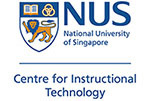
- Dr Low Hong Tong uses wiki project for introductory module on fluid dynamics
- students work in groups developing informational wiki about diseases involving blood flow
- wiki history helps to track contributions, which is taken into account for marking
GEK1524 Living with Fluids is a general education module about the role of fluid dynamics and the use of flow concepts in every day life. This includes weather, flight and propulsion.
Dr Low Hong Tong, an Associate Professor at the Department of Mechanical Engineering, teaches this general course which takes in students from various faculties.
Usually, Dr Low teaches the section about blood flow. Previously, a quiz marked the end of this particular aspect of Living with Fluids. He sought to change that as it was difficult to get participation during tutorials as many students concentrated on individually learning what was required for the quiz. It was difficult to motivate active learning in a large-class setting.
At a CDTL conference on teaching and learning, Dr Low discovered a possible solution: a wiki-based project. Since the effort would be significant, he replaced the quiz entirely with the wiki project.
The Wiki Way
Screenshot from thrombosis project wiki - Click image to visit. NUSNET login required.
"For this module that I'm teaching, it is advantageous to use wikis for collaborative learning because my students come from many different faculties," Dr Low explains, "They are scattered throughout campus and find it hard to meet. With the wiki, they can work in separate places and contribute to the project."
Dr Low divided 61 students into seven groups, about nine members per group, making sure that there was an even spread of students from various faculties. Each group was assigned to write about a disease involving blood flow, such as atherosclerosis. The groups had to ensure a general audience would know more about the disease - both its fluid dynamics and medical aspects - by reading their wikis.
After explaining the basics of wiki use, Dr Low left the students to their own devices. The students initiated the wikis on Wiki.nus. They used tutorial time as face-to-face discussions about the progress of the projects. Largely, much of the actual research, writing and editing took place outside the classroom.
Marks were based on overall group performance. Individual contributions were also taken into consideration. Students had to submit a one page write-up of their contributions. Dr Low also looked at the wikis' history page to gather a sense of who did what and how much work each student put into the project.
Dr Low states, "This is the main advantage of wikis. But it is definitely more work to monitor wiki contributions." Nevertheless, he is happy to have this advantage even though it takes up time.
His students also had to rank all the group projects as a form of peer-assessment because peer recognition is valued highly.
By and large, the wiki project worked well. The students worked enthusiastically on their wikis and completed the project within the one-month schedule.
Mr Yeh Yu Jie, a Science student who worked on a project about endothelial damage, remarked, "It is a very new idea to me because I did not know that Wiki.nus existed. I feel that it is very convenient as all the members can edit the article directly, so we do not need to keep meeting up for discussions. When I feel something is not right I can change or update it myself. I do not need to get the administrator of the article to do it."
Improvements
According to Dr Low, some things can be improved. He thinks that he has to set out clear expectations and provide structure. This will allow students to be more balanced in their write-ups, instead of focusing too deeply on a particular aspect of the disease they were writing about.
Dr Low also felt that he needs to find a way to get students to be more involved in other groups' work. Besides not commenting on or linking to other group wikis, he understands some students were reluctant to edit other groups' work.
Some traditional group work issues were also present: the feeling that the project required more work, that contributions might not be recognised and that team followers might get the same marks as drivers.
Despite these teething issues, Dr Low will continue setting wiki projects for his students next year. It looks like more student will be learning about living with fluids while working with wikis.



